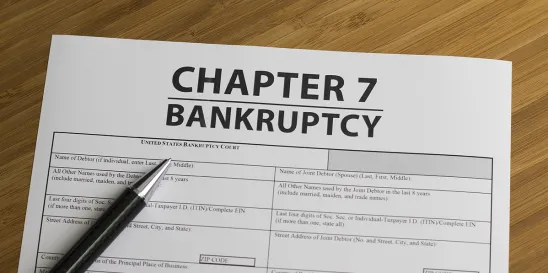A recent decision from a bankruptcy court in Delaware provides a cautionary tale about the risks of involuntary bankruptcy.
In the Delaware case, the debtor managed a group of investment funds. The business was all but defunct when several investors, dissatisfied with the debtor's management, filed an involuntary Chapter 7 petition. They obtained an order for relief from the bankruptcy court, then removed the debtor as manager of the funds and inserted their hand-picked manager. So far, so good.
The debtor, who was not properly served with the involuntary petition and did not give the petition the attention it required, struck back and convinced the bankruptcy court to set aside the order for relief. The debtor then went after the involuntary petitioners for damages. After 8 years of litigation, the Delaware court awarded the debtor $740,000 in damages – all of it attributable to attorneys' fees and costs.
If you file an involuntary petition and the bankruptcy court dismisses it, then a debtor can recover costs and reasonable attorneys' fees. The legal fees include the amount necessary to defeat the involuntary filing. In addition, if the court finds that the petition was filed in bad faith, then the court also can enter judgment for all damages proximately caused by the filing and punitive damages. The Delaware court awarded the debtor $75,000 for defeating the involuntary petition.
The debtor also sought a judgment for attorneys' fees in pursuit of damages for violating the automatic stay. The involuntary petitioners had replaced the debtor as manager without first obtaining leave from the court to do so. The investment fund was barely operating and had little income to support a claim for actual damages. Nevertheless, the Delaware court awarded $665,000 in attorneys' fees related to litigating the automatic stay violation.
Because the debtor had no "actual" damages from the stay violation, the involuntary petitioners contended that the debtor was not entitled to recovery of attorneys' fees. The Delaware court pointed out that "actual" damages (e.g., loss of business income) are not a prerequisite to the recovery of attorneys' fees, much to the chagrin of the defendants. The court held that attorneys' fees and costs are always "actual damages" in the context of a willful violation of the automatic stay.
The Delaware court also rejected defendants' argument that the fee amount was "unreasonable" since there was no monetary injury to the business. In other words, the debtor should not have spent so much money on legal fees because it lost on its claim. The court held that defendants' argument was made "with the benefit of hindsight" – at the end of litigation when the court had ruled, after an evidentiary trial, that debtor suffered no actual injury. The court pointed out that the debtor sought millions in damages for the loss of management's fees, and even though the court rejected the claim after trial, it was not an unreasonable argument for the debtor to make. The court concluded that "the reasonableness of one's conduct must be assessed at the time of the conduct and based on the information that was known or knowable at the time."
The involuntary petitioners likely had sound reasons to want the debtor removed as fund manager. But by pursuing involuntary bankruptcy and losing, they ended up having to stroke a check to the debtor for over $700,000. Talk about adding insult to injury. The upshot is that involuntary bankruptcy is an extreme and risky action that should be a last-resort option undertaken with extreme caution.




 />i
/>i

